- Home
- Louisa May Alcott
The Annotated Little Women Page 33
The Annotated Little Women Read online
Page 33
“What a trying world it is!” said Jo, rumpling up her hair in a fretful sort of way. “No sooner do we get out of one trouble than down comes another. There don’t seem to be anything to hold on to when mother’s gone; so I’m all at sea.”
“Well, don’t make a porcupine of yourself, it isn’t becoming. Settle your wig, Jo, and tell me if I shall telegraph to your mother, or do anything?” asked Laurie, who never had been reconciled to the loss of his friend’s one beauty.
“That is what troubles me,” said Meg. “I think we ought to tell her if Beth is really ill, but Hannah says we mustn’t, for mother can’t leave father, and it will only make them anxious. Beth won’t be sick long, and Hannah knows just what to do, and mother said we were to mind her, so I suppose we must, but it don’t seem quite right to me.”
“Hum, well, I can’t say; suppose you ask grandfather, after the doctor has been.”
“We will; Jo, go and get Dr. Bangs at once,” commanded Meg; “we can’t decide anything till he has been.”
“Stay where you are, Jo; I’m errand boy to this establishment,” said Laurie, taking up his cap.
“I’m afraid you are busy,” began Meg.
“No, I’ve done my lessons for the day.”
“Do you study in vacation time?” asked Jo.
“I follow the good example my neighbors set me,” was Laurie’s answer, as he swung himself out of the room.
“I have great hopes of my boy,” observed Jo, watching him fly over the fence with an approving smile.
“He does very well—for a boy,” was Meg’s somewhat ungracious answer, for the subject did not interest her.
Dr. Bangs came, said Beth had symptoms of the fever, but thought she would have it lightly, though he looked sober over the Hummel story. Amy was ordered off at once, and provided with something to ward off danger; she departed in great state, with Jo and Laurie as escort.
Aunt March received them with her usual hospitality.
“What do you want now?” she asked, looking sharply over her spectacles, while the parrot, sitting on the back of her chair, called out,—
“Go away; no boys allowed here.”
Laurie retired to the window, and Jo told her story.
“No more than I expected, if you are allowed to go poking about among poor folks. Amy can stay and make herself useful if she isn’t sick, which I’ve no doubt she will be,—looks like it now. Don’t cry, child, it worries me to hear people sniff.”
Amy was on the point of crying, but Laurie slyly pulled the parrot’s tail, which caused Polly to utter an astonished croak, and call out,—
“Bless my boots!”9 in such a funny way, that she laughed instead.
“What do you hear from your mother?” asked the old lady, gruffly.
“Father is much better,” replied Jo, trying to keep sober.
“Oh, is he? Well, that won’t last long, I fancy, March never had any stamina,” was the cheerful reply.
“Ha, ha! never say die, take a pinch of snuff, good-by, good-by!” squalled Polly, dancing on her perch, and clawing at the old lady’s cap as Laurie tweaked him in the rear.
“Hold your tongue, you disrespectful old bird! and, Jo, you’d better go at once; it isn’t proper to be gadding about so late with a rattle-pated boy like—”
“Hold your tongue, you disrespectful old bird!” cried Polly, tumbling off the chair with a bounce and running to peck the “rattle-pated” boy, who was shaking with laughter at the last speech.
“I don’t think I can bear it, but I’ll try,” thought Amy, as she was left alone with Aunt March.
“Get along, you’re a fright!” screamed Polly, and at that rude speech Amy could not restrain a sniff.
1. arsenicum . Short for Arsenicum album, or arsenic trioxide. Though it is still used today, in extreme dilution, as a homeopathic medicine, the compound is toxic and quite dangerous. Bronson and Abba Alcott were firm believers in homeopathy and resorted regularly to homeopathic cures in the unsuccessful treatment of Lizzie’s scarlet fever and its aftermath.
Alcott’s portable case of homeopathic medicines. (Louisa May Alcott Memorial Association)
2. “I think you or Hannah ought to go.” By deciding not to visit the Hummels, Meg and Jo unwittingly set in motion the causes that lead to Beth’s grave illness. Thankfully, there was no such immediate cause for guilt in the Alcott family. In June 1856, when her exposure to the Halls gave her scarlet fever, Lizzie Alcott was living with her parents and younger sister May in Walpole, New Hampshire. At that time, twenty-three-year-old Louisa was in Boston, trying “to support [her]self . . . by sewing, teaching & writing” (Louisa May Alcott, Journals, p. 76). Anna, following an exhausting stint as a teacher at an insane asylum in Syracuse, New York, was visiting Louisa. When the two older sisters came home, Lizzie was already seriously ill. Unlike Amy March, who avoids contracting the disease, May Alcott developed scarlet fever alongside her sister, but recovered. The Halls lost two of their children to the fever.
3. camphor. Found in the wood of an Asian evergreen tree, camphor was used in the nineteenth century to treat a broad range of diseases, including gout, cholera, and bronchitis, to largely indifferent effect. Still used to combat colds, influenza, fevers, and other conditions, it is toxic in large doses.
4. “scarlet fever, haven’t you?” Also known as scarlatina, scarlet fever is an infectious disease that most often victimizes children. It is caused by erythrogenic toxin, a substance generated by the bacterium Streptococcus. Now readily treatable with antibiotics, it had no known cure in Alcott’s time. In 1842, the disease had claimed Emerson’s beloved eldest son, Waldo. A scarlet fever epidemic besieged Massachusetts in 1858–59, killing upward of two thousand people, almost all of whom were children under the age of sixteen. Another occurred while Alcott was at work on Part First of Little Women.
5. “belladonna.” Derived from deadly nightshade, one of the most toxic plants in the western hemisphere, belladonna was a homeopathic remedy for fevers. It is now considered useless in the treatment of scarlet fever. In suggesting that the highly poisonous plant be self-administered by an adolescent girl as a home remedy, the Hummels’ doctor exercises shockingly poor judgment. Some of Beth’s later-reported symptoms, most notably her delirium, might be more traceable to the use of belladonna than to fever.
6. “to keep her out of harm’s way.” May Alcott, who contracted scarlet fever at the same time as Lizzie, was not sent away from the family during that episode. She was kept out of the sickroom when Louisa came home from her Civil War nursing in January 1863. The Alcotts feared that May, who had lately been ill, would be “very liable to take” Louisa’s infection (bMS Am 1817 [56], Houghton Library, Harvard University). Instead of staying with relatives, May spent time with the Hawthornes.
7. for she did not like nursing, and Jo did. Jo’s caring for Beth reprises in miniature Alcott’s service as an army nurse. Alcott wrote little about caring for Lizzie in the early phases of her sister’s illness.
8. “trotting wagon.” Another term for a sulky, in which the driver sits while driving the horse before him. The trotting wagon shown here was painted by Nathaniel Currier of Currier and Ives.
9. “Bless my boots!” The wisecracking tendencies of Aunt March’s Polly may have been partly inspired by Grip, the irrepressibly chatty raven belonging to the title character in Dickens’s novel Barnaby Rudge (1841).
CHAPTER XVIII.
Dark Days.
BETH did have the fever, and was much sicker than any one but Hannah and the doctor suspected. The girls knew nothing about illness, and Mr. Laurence was not allowed to see her, so Hannah had everything all her own way, and busy Dr. Bangs did his best, but left a good deal to the excellent nurse. Meg stayed at home, lest she should infect the Kings, and kept house, feeling very anxious, and a little guilty, when she wrote letters in which no mention was made of Beth’s illness. She could not think it right to deceive her mother, but she had been bidden to m
ind Hannah, and Hannah wouldn’t hear of “Mrs. March bein’ told, and worried just for sech a trifle.” Jo devoted herself to Beth day and night; not a hard task, for Beth was very patient, and bore her pain uncomplainingly as long as she could control herself. But there came a time when during the fever fits she began to talk in a hoarse, broken voice, to play on the coverlet, as if on her beloved little piano, and try to sing with a throat so swollen, that there was no music left; a time when she did not know the familiar faces round her, but addressed them by wrong names,1 and called imploringly for her mother. Then Jo grew frightened, Meg begged to be allowed to write the truth, and even Hannah said she “would think of it, though there was no danger yet.” A letter from Washington added to their trouble, for Mr. March had had a relapse, and could not think of coming home for a long while.2
Beth (Margaret O’Brien) clings to life in the 1949 film. (Photofest)
How dark the days seemed now, how sad and lonely the house, and how heavy were the hearts of the sisters as they worked and waited, while the shadow of death hovered over the once happy home! Then it was that Margaret, sitting alone with tears dropping often on her work, felt how rich she had been in things more precious than any luxuries money could buy; in love, protection, peace and health, the real blessings of life. Then it was that Jo, living in the darkened room with that suffering little sister always before her eyes, and that pathetic voice sounding in her ears, learned to see the beauty and the sweetness of Beth’s nature, to feel how deep and tender a place she filled in all hearts, and to acknowledge the worth of Beth’s unselfish ambition, to live for others, and make home happy by the exercise of those simple virtues which all may possess, and which all should love and value more than talent, wealth or beauty. And Amy, in her exile, longed eagerly to be at home, that she might work for Beth, feeling now that no service would be hard or irksome, and remembering, with regretful grief, how many neglected tasks those willing hands had done for her. Laurie haunted the house like a restless ghost, and Mr. Laurence locked the grand piano, because he could not bear to be reminded of the young neighbor who used to make the twilight pleasant for him. Every one missed Beth. The milk-man, baker, grocer and butcher inquired how she did; poor Mrs. Hummel came to beg pardon for her thoughtlessness, and to get a shroud for Minna; the neighbors sent all sorts of comforts and good wishes, and even those who knew her best, were surprised to find how many friends shy little Beth had made.
An airy, immaculately kept Union hospital ward. Relatively few wounded men in the Civil War saw this kind of luxury. Alcott referred to the hospital where she performed her nursing duties as a “perfect pestilence-box.” (Library of Congress)
Meanwhile she lay on her bed with old Joanna at her side, for even in her wanderings she did not forget her forlorn protégé. She longed for her cats, but would not have them brought, lest they should get sick; and, in her quiet hours, she was full of anxiety about Jo. She sent loving messages to Amy, bade them tell her mother that she would write soon; and often begged for pencil and paper to try to say a word, that father might not think she had neglected him. But soon even these intervals of consciousness ended, and she lay hour after hour tossing to and fro with incoherent words on her lips, or sank into a heavy sleep which brought her no refreshment. Dr. Bangs came twice a day, Hannah sat up at night, Meg kept a telegram in her desk all ready to send off at any minute, and Jo never stirred from Beth’s side.
The first of December was a wintry day indeed to them, for a bitter wind blew, snow fell fast, and the year seemed getting ready for its death. When Dr. Bangs came that morning, he looked long at Beth, held the hot hand in both his own a minute, and laid it gently down, saying, in a low tone, to Hannah,—
“If Mrs. March can leave her husband, she’d better be sent for.”
Hannah nodded without speaking, for her lips twitched nervously; Meg dropped down into a chair as the strength seemed to go out of her limbs at the sound of those words, and Jo, after standing with a pale face for a minute, ran to the parlor, snatched up the telegram, and, throwing on her things, rushed out into the storm. She was soon back, and, while noiselessly taking off her cloak, Laurie came in with a letter, saying that Mr. March was mending again. Jo read it thankfully, but the heavy weight did not seem lifted off her heart, and her face was so full of misery that Laurie asked, quickly,—
Orchard House under a blanket of snow. (Louisa May Alcott Memorial Association)
“What is it? is Beth worse?”
“I’ve sent for mother,” said Jo, tugging at her rubber boots with a tragical expression.
“Good for you, Jo! Did you do it on your own responsibility?” asked Laurie, as he seated her in the hall chair, and took off the rebellious boots, seeing how her hands shook.
“No, the doctor told us to.”
“Oh, Jo, it’s not so bad as that?” cried Laurie, with a startled face.
“Yes, it is; she don’t know us, she don’t even talk about the flocks of green doves, as she calls the vine leaves on the wall; she don’t look like my Beth, and there’s nobody to help us bear it; mother and father both gone, and God seems so far away I can’t find Him.”
As the tears streamed fast down poor Jo’s cheeks, she stretched out her hand in a helpless sort of way, as if groping in the dark, and Laurie took it in his, whispering, as well as he could, with a lump in his throat,—
“I’m here, hold on to me, Jo, dear!”
She could not speak, but she did “hold on,” and the warm grasp of the friendly human hand comforted her sore heart, and seemed to lead her nearer to the Divine arm which alone could uphold her in her trouble. Laurie longed to say something tender and comfortable, but no fitting words came to him, so he stood silent, gently stroking her bent head as her mother used to do. It was the best thing he could have done; far more soothing than the most eloquent words, for Jo felt the unspoken sympathy, and, in the silence, learned the sweet solace which affection administers to sorrow. Soon she dried the tears which had relieved her, and looked up with a grateful face.
“Thank you, Teddy, I’m better now; I don’t feel so forlorn, and will try to bear it if it comes.”
“Keep hoping for the best; that will help you lots, Jo. Soon your mother will be here, and then everything will be right.”
“I’m so glad father is better; now she won’t feel bad about leaving him. Oh, me! it does seem as if all the troubles came in a heap, and I got the heaviest part on my shoulders,” sighed Jo, spreading her wet handkerchief over her knees, to dry.
“Don’t Meg pull fair?” asked Laurie, looking indignant.
“Oh, yes; she tries to, but she don’t love Bethy as I do; and she won’t miss her as I shall. Beth is my conscience, and I can’t give her up; I can’t! I can’t!”
Down went Jo’s face into the wet handkerchief, and she cried despairingly; for she had kept up bravely till now, and never shed a tear. Laurie drew his hand across his eyes, but could not speak till he had subdued the choky feeling in his throat, and steadied his lips. It might be unmanly, but he couldn’t help it, and I am glad of it. Presently, as Jo’s sobs quieted, he said, hopefully, “I don’t think she will die; she’s so good, and we all love her so much, I don’t believe God will take her away yet.”
“The good and dear people always do die,”3 groaned Jo, but she stopped crying, for her friend’s words cheered her up, in spite of her own doubts and fears.
“Poor girl! you’re worn out. It isn’t like you to be forlorn. Stop a bit; I’ll hearten you up in a jiffy.”
Laurie went off two stairs at a time, and Jo laid her wearied head down on Beth’s little brown hood, which no one had thought of moving from the table where she left it. It must have possessed some magic, for the submissive spirit of its gentle owner seemed to enter into Jo; and, when Laurie came running down with a glass of wine, she took it with a smile, and said, bravely, “I drink—Health to my Beth! You are a good doctor, Teddy, and such a comfortable friend; how can I ever pay you?” she ad
ded, as the wine refreshed her body, as the kind words had done her troubled mind.
“I’ll send in my bill, by and by; and to-night I’ll give you something that will warm the cockles of your heart better than quarts of wine,” said Laurie, beaming at her with a face of suppressed satisfaction at something.
“What is it?” cried Jo, forgetting her woes for a minute, in her wonder.
“I telegraphed to your mother yesterday, and Brooke answered she’d come at once, and she’ll be here to-night, and everything will be all right. Aren’t you glad I did it?”
Laurie spoke very fast, and turned red and excited all in a minute, for he had kept his plot a secret, for fear of disappointing the girls or harming Beth. Jo grew quite white, flew out of her chair, and the moment he stopped speaking she electrified him by throwing her arms round his neck, and crying out, with a joyful cry, “Oh, Laurie! oh, mother! I am so glad!” She did not weep again, but laughed hysterically, and trembled and clung to her friend as if she was a little bewildered by the sudden news. Laurie, though decidedly amazed, behaved with great presence of mind; he patted her back soothingly, and, finding that she was recovering, followed it up by a bashful kiss or two, which brought Jo round at once. Holding on to the banisters, she put him gently away, saying, breathlessly, “Oh, don’t! I didn’t mean to; it was dreadful of me; but you were such a dear to go and do it in spite of Hannah, that I couldn’t help flying at you. Tell me all about it, and don’t give me wine again; it makes me act so.”4
“I don’t mind!” laughed Laurie, as he settled his tie. “Why, you see I got fidgety, and so did grandpa. We thought Hannah was overdoing the authority business, and your mother ought to know. She’d never forgive us if Beth,—well, if anything happened, you know. So I got grandpa to say it was high time we did something, and off I pelted to the office yesterday, for the doctor looked sober, and Hannah most took my head off when I proposed a telegram. I never can bear to be ‘marmed over’; so that settled my mind, and I did it. Your mother will come, I know, and the late train5 is in at two, A.M. I shall go for her; and you’ve only got to bottle up your rapture, and keep Beth quiet, till that blessed lady gets here.”

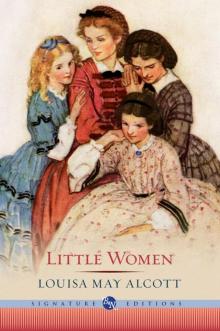 Little Women
Little Women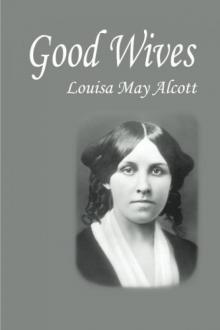 Good Wives
Good Wives Jo's Boys
Jo's Boys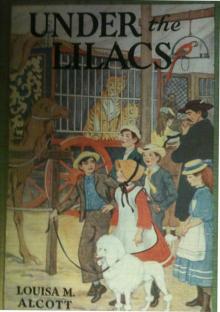 Under the Lilacs
Under the Lilacs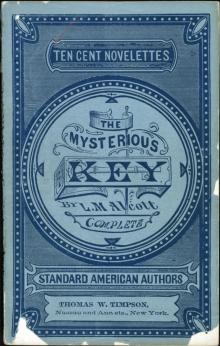 The Mysterious Key and What It Opened
The Mysterious Key and What It Opened The Inheritance
The Inheritance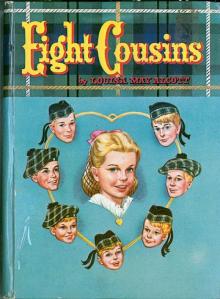 Eight Cousins
Eight Cousins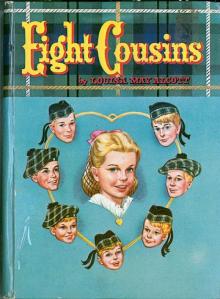 Eight Cousins; Or, The Aunt-Hill
Eight Cousins; Or, The Aunt-Hill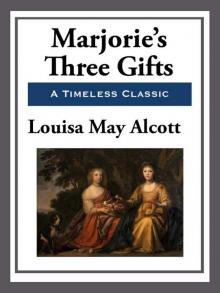 Marjorie's Three Gifts
Marjorie's Three Gifts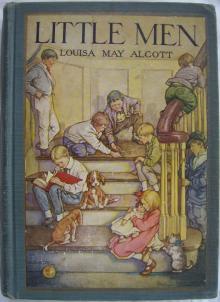 Little Men
Little Men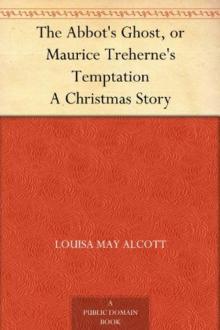 The Abbot's Ghost, or Maurice Treherne's Temptation: A Christmas Story
The Abbot's Ghost, or Maurice Treherne's Temptation: A Christmas Story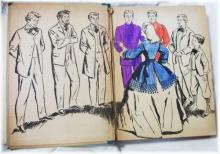 Rose in Bloom
Rose in Bloom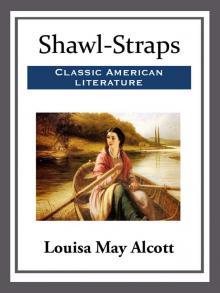 Shawl-Straps
Shawl-Straps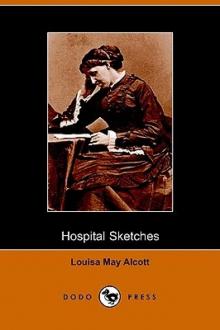 Hospital Sketches
Hospital Sketches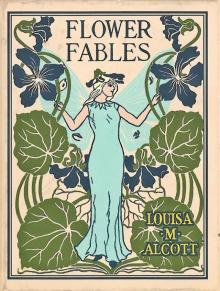 Flower Fables
Flower Fables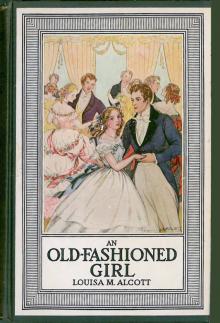 An Old-Fashioned Girl
An Old-Fashioned Girl The Candy Country
The Candy Country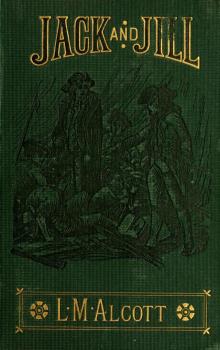 Jack and Jill
Jack and Jill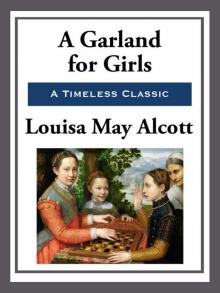 A Garland for Girls
A Garland for Girls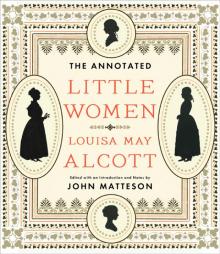 The Annotated Little Women
The Annotated Little Women A Classic Christmas
A Classic Christmas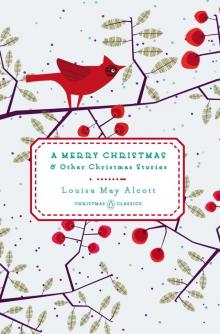 A Merry Christmas
A Merry Christmas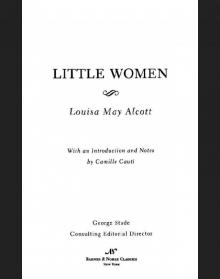 Little Women (Barnes & Noble Classics Series)
Little Women (Barnes & Noble Classics Series)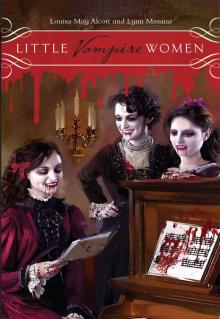 Little Vampire Women
Little Vampire Women